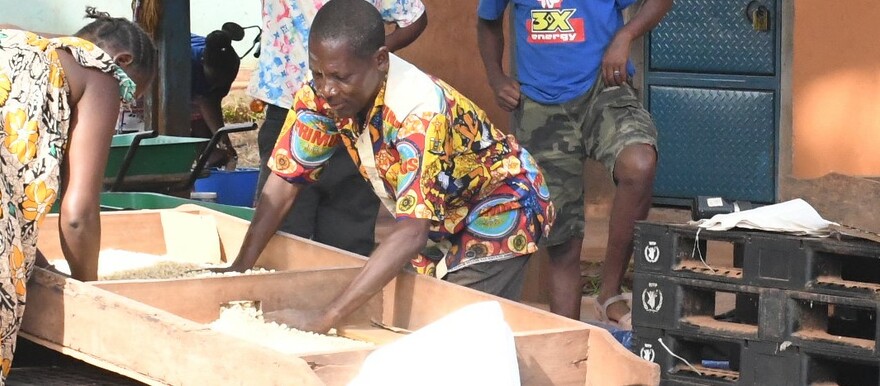Farmers in Yambio town, Western Equatoria State, have expressed frustration over decreased revenue from grain sales, attributing it to the UN World Food Program’s (WFP) decision to engage intermediary companies instead of directly purchasing from farmers. Despite these challenges, farmers acknowledge increased agricultural production in recent years due to support from the WFP’s Smallholder Agriculture Market Support (SAMS) project.
Speaking to Radio Tamazuj, Anthony Ezekiel, Chairperson of Yambio Farmers and Business Cooperative, expressed concerns about the impact of the WFP’s new approach on their income. He explained, “Previously, between 2015 and 2017, we dealt directly with the WFP. During that time, the WFP purchased maize grains directly from us. The direct transactions were more beneficial for our farmers. For instance, we used to sell 1 ton for $400. However, now that the WFP is using intermediaries, farmers receive less, sometimes less than $300.”
Ezekiel also highlighted the financial challenges faced by farmers in the production process. “The costs incurred in production outweigh the profits. When you consider expenses for land preparation, planting, harvesting, and transportation, farmers end up earning less,” he stated.
The WFP is currently implementing the Smallholder Agriculture Market Support (SAMS) project to address the challenges faced by smallholder farmers. This initiative aims to mitigate post-harvest losses, improve financial management, and enhance market access for farmers. It includes activities such as providing market information, conducting training on cooperative governance and agribusiness, and facilitating market access.
Amos Valerio Rungba, a farmer in Yambio County, shared that before the introduction of the Smallholder Agriculture Market Support (SAMS) project by the WFP and its partners, his yields often went to waste due to inadequate storage facilities and a lack of proper farming skills.
Valerio explained, “Production was very poor before the WFP program because we had no support. Everything we produced would go to waste. But now, with WFP’s support, we can produce, and the WFP purchases our crops.”
He noted that the project has not only improved his yield production but has also transformed his life. “The project has made a significant difference. Over the past two years, my life has changed. I was able to buy a motorcycle, which helps me transport pregnant women to the hospital in our community. Additionally, I have diversified my income by starting a pig farming business,” Valerio said.
Loice Wilson Mbiro, a 31-year-old mother of seven and a farmer in Yambio, emphasized how the project funded by the German Government through the WFP has significantly improved her life. She explained that by working as a group farmer in a cooperative for seven years, she has been able to cultivate a large piece of land and plant maize, which has enabled her to pay school fees for her children and meet their basic needs.
Loice reflected on her journey, stating, “Life was challenging before the WFP project. I could only produce a small amount of food for my family because I was working alone. However, after joining the cooperative and with the support of the WFP, my life has changed drastically. I can now produce a substantial amount of food, with enough left over to sell and cover my children’s school fees and medical bills.”
She further elaborated, “Before joining the cooperative, I could only produce two 100-kilogram bags of maize. But now, as part of the group, I can produce 3 tons, which has made a significant difference in my life.”
Yona Robert Mark, the Western Equatoria State Minister of Cooperative and Rural Development, commended the WFP for purchasing 455 metric tons of grains from smallholder farmers and cooperatives in the region. He highlighted the significant achievement this represents for local farmers and encouraged the WFP to provide them with training in mechanized farming, an area where they currently lack skills.
“This is a tremendous accomplishment for our farmers in Western Equatoria. It will greatly enhance food security in the state. Our farmers have achieved this milestone, and we expect even more success in the future. We urge the WFP to focus more on mechanizing agriculture, particularly by introducing tractors to assist our farmers,” Yona remarked.
Meanwhile, Peter Loruk, an Agribusiness Development Officer for the WFP, explained that they support small-scale farmers with various training programs, including post-harvest management, financial literacy, and farming as a business. Additionally, they provide farmers with necessary equipment such as ox ploughs and post-harvest tools like silos and storage bags to help preserve their produce.
“Our goal is to empower South Sudan’s small-scale farmers with knowledge and tools to increase their productivity, improve their livelihoods, and access markets. We’ve already purchased 445 metric tons of grains from smallholders, injecting nearly $365,000 into their hands. In Western Equatoria alone, we’re supporting 3,000 farmers,” Loruk explained.
He revealed that since the project began in 2018, agricultural production in the state has improved significantly due to their training and the creation of a ready market for farmers’ yields.
“Our training and capacity-building efforts have borne fruit. Initially, farmers struggled to produce surplus for sale, but now they’re not only meeting household needs but also generating surplus for the market. This is evident in the 445 metric tons we’ve purchased. We’ve trained farmers in post-harvest management, good agricultural practices, marketing, and financial literacy. Many have formed cooperatives and registered with the government,” Loruk added.




